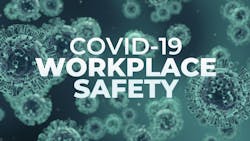Virginia Passes Permanent Standard on COVID-19
The Virginia Safety and Health Codes Board enacted a Permanent Standard on COVID-19 in workplaces in a 9-4 vote on January 13, 2021. Governor Northam is reviewing it. If he has amendments, the Board will consider them on January 19. It should be effective no later than January 26.
On July 15, 2020, Virginia became the first state in the nation to promulgate an Emergency Temporary Standard to address COVID-19 in workplaces. Even with vaccine deliveries on the way, Virginia has proposed a Permanent Standard for consideration by the Virginia Safety and Health Codes Board (which includes author Courtney Malveaux).
The Emergency Temporary Standard
Since July 27, 2020, Virginia Occupational Safety and Health (VOSH), the state’s version of the Occupational Safety and Health Administration (OSHA), has enforced an Emergency Temporary Standard that mandates, and in some instances exceeds, guidance issued by the U.S. Centers for Disease Control and Prevention (CDC) and OSHA. The Emergency Temporary Standard covers most private employers in Virginia, as well as all state and local employees.
Virginia is a “State Plan” state that operates its own occupational safety and health program under an OSHA grant. There are 27 other “State Plan” states that are enabled to promulgate similar COVID-19 standards as well. Michigan, Oregon, and California have already done so. While not a “State Plan” state, New Jersey has promulgated COVID-19 restrictions that cover workplaces as well.
In addition to CDC and OSHA guidelines, the Emergency Temporary Standard includes provisions that require employers to:
- Provide telework and staggered shifts when feasible;
- Provide both handwashing stations and hand sanitizer when feasible;
- Assess risk levels of employees and suppliers before entry;
- Notify the Virginia Department of Health of positive COVID-19 tests;
- Notify VOSH of three or more positive COVID-19 tests within a two-week period;
- Assess hazard levels of all job tasks;
- Provide COVID-19 training of all employees within 30 days (except for low-hazard places of employment);
- Prepare infectious disease preparedness and response plans within 60 days;
- Post or present agency-prepared COVID-19 information to all employees; and
- Maintain air handling systems in accordance with manufacturers’ instructions and American National Standards Institute (ANSI) and American Society of Heating, Refrigerating and Air-Conditioning Engineers (ASHRAE) standards.
The Emergency Temporary Standard protects employees who raise reasonable concerns about infection control to print, online, social, or other media. It also requires building and facility owners to report positive COVID-19 tests to employer tenants. The Emergency Temporary Standard also implements provisions that echo CDC and OSHA guidance, including requirements to:
- Place requirements on workplaces based on hazard levels (i.e., “very high,” “high,” “medium,” and “low”);
- Screen employees prior to entry to work;
- Establish requirements for employees with COVID-19 positive tests and symptoms before returning to work;
- Require social distancing or, when social distancing is not possible, respiratory protection; and
- Clean and disinfect commonly used areas and equipment.
The Emergency Temporary Standard is set to expire January 26, 2021. A business organization and several employers have challenged the Emergency Temporary Standard in a lawsuit pending in the Circuit Court for the City of Richmond, Virginia.
The Permanent Standard
The Permanent Standard will supersede the Emergency Temporary Standard. Governor Ralph Northam will review the Permanent Standard and, if he does not suggest revisions, the Permanent Standard will be effective upon filing with the Registrar of Regulations and publications in a newspaper in Richmond, Virginia. If the Governor suggests revisions, the Safety and Health Codes Board will consider them, and the standard will be effective upon filing and publication.
The Permanent Standard includes the provisions that are in the Emergency Temporary Standard, with several changes:
- Requirements unrelated to occupational safety and health, such as contingency planning for business operations in the event of an outbreak and flexible sick leave policies, have been removed.
- No enforcement actions will be brought against healthcare providers and other employers that are making good faith efforts to secure Personal Protective Equipment (PPE) that is in short supply.
- It cannot be used to enforce Governor Northam’s Executive Orders. This takes on particular significance in light of Governor Northam’s most recent Order expanding face covering requirements, particularly in indoor settings. It is unclear whether the Order applies to low-hazard workplaces with physically distanced employees.
- It scales back the requirement to report every single positive COVID-19 case to the Virginia Department of Health to “outbreaks” of two or more cases.
- It eliminates test-based return-to-work requirement, leaving employers with a time-based requirement only.
- It makes the time-based return-to-work requirement consistent with CDC guidance that reduced the requirement from 10 days with three symptom-free days to t10en days with only one symptom-free day.
- It provides alternative controls to the requirement for employers to comply with respiratory standards when multiple employees travel in work vehicles together, in light of shortages of N-95 and other filtering facepiece respirators.
The Permanent Standard carries forward several problematic aspects of the Emergency Temporary Standard. First, it includes no bar on prohibiting employees from coming to work after close contact with an individual who has tested positive for COVID-19. Second, several of its provisions relating to return-to-work and close contact do not enable employers to benefit from continually evolving CDC guidance. Third, it includes whistleblower protections for employees who report concerns to the news media or social media, which may invalidate some employers’ media policies. Finally, the Permanent Standard lacks “safe harbor” protections for employers that protect employees by following CDC guidance.
Courtney Malveaux is a Principal in the Richmond, Virginia office of Jackson Lewis P.C. and Co-Leader of the firm’s Workplace Safety and Health Practice Group.
